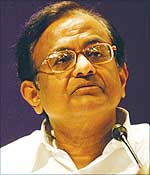|
|
| Help | |
| You are here: Rediff Home » India » Business » Report |
|
 Union Finance Minister P Chidambaram. Photograph: Paresh Gandhi | ||
| |||||||||||||||||||||||||||||||||||||||||
|
| |||||||||||||||||||||||||||||||||||||||||
In an exclusive interview with NDTV Profit, to be telecast on Friday at 1900 hrs and 2230 hrs, Finance Minister, P Chidambaram shares his views on his columns he wrote while out of power during the regime of National Democratic Alliance.
Admitting to lost opportunities due to differences within the United Progressive Alliance, he says, "Maybe I am not a very good politician or a good advocate of the cause. . . there are differences. . . democracies elects political parties with different ideology . . . some things are possible some are not."
At a time when agriculture growth is the biggest concern for the UPA which was voted into power on the Aam Aadmi slogan, the finance minister stresses how consumers should be willing to pay more for food products if Indian agriculture has to prosper.
"The issue is we want to pay more sugarcane but less for sugar, more for paddy but less for rice. Do we want agriculture to be remunerative and self sufficient? If you want agriculture to remain remunerative and self-sufficient, the only way is for consumers to spend more of their disposable income on food."
Watch the entire exclusive interview with the Finance Minister P Chidambaram on Friday (June 15), at 1900 hrs and 2230 hrs only on NDTV Profit.
On inflation
Can we now afford higher inflation?
No, we cannot, but I don't think paying one rupee more per kilo is inflationary. It is a strange paradox.
So where is the problem of the paradox?
Problem is in the political system. Nobody wants to take the bulls by the horns.
On divestment programme
Speaking out his mind on the now stalled divestment programme, the finance minister admits there are several PSUs which are yet to turn efficient. He says, "Some yes. . . but some are being turned around. . . by simply imposing greater discipline. . . cleaning up balance sheets and setting stiff targets. . . 12 or 13 PSUs now don't depend on the government for wages. . . they are on a sounder footing. . . but I concede there are still some PSUs which are performing poorly. . . "
Given a choice. . . given a mandate of the prime minister. . . would you embark on a divestment programme if the prime minister pushed it?
No, that's on hold.
But would you push it?
Internally yes. . . but unless a decision is taken I can't speak about it. But the point today is that it is on hold. . . the only leeway we have is that if a PSU goes in for an IPO we can piggyback on that to raise funds.
On reforms
On his unfinished task on reforms, the finance minister is clear that a bigger thrust is needed in areas where reforms haven't even started. He says, 'we should get our act together over the next 22 months, the agriculture agenda, agenda on power, coal and mining and deliver better on road, healthcare and water supply. . .'
Will that be your reform focus?
Yes. . .
|
|
| © 2007 Rediff.com India Limited. All Rights Reserved. Disclaimer | Feedback |